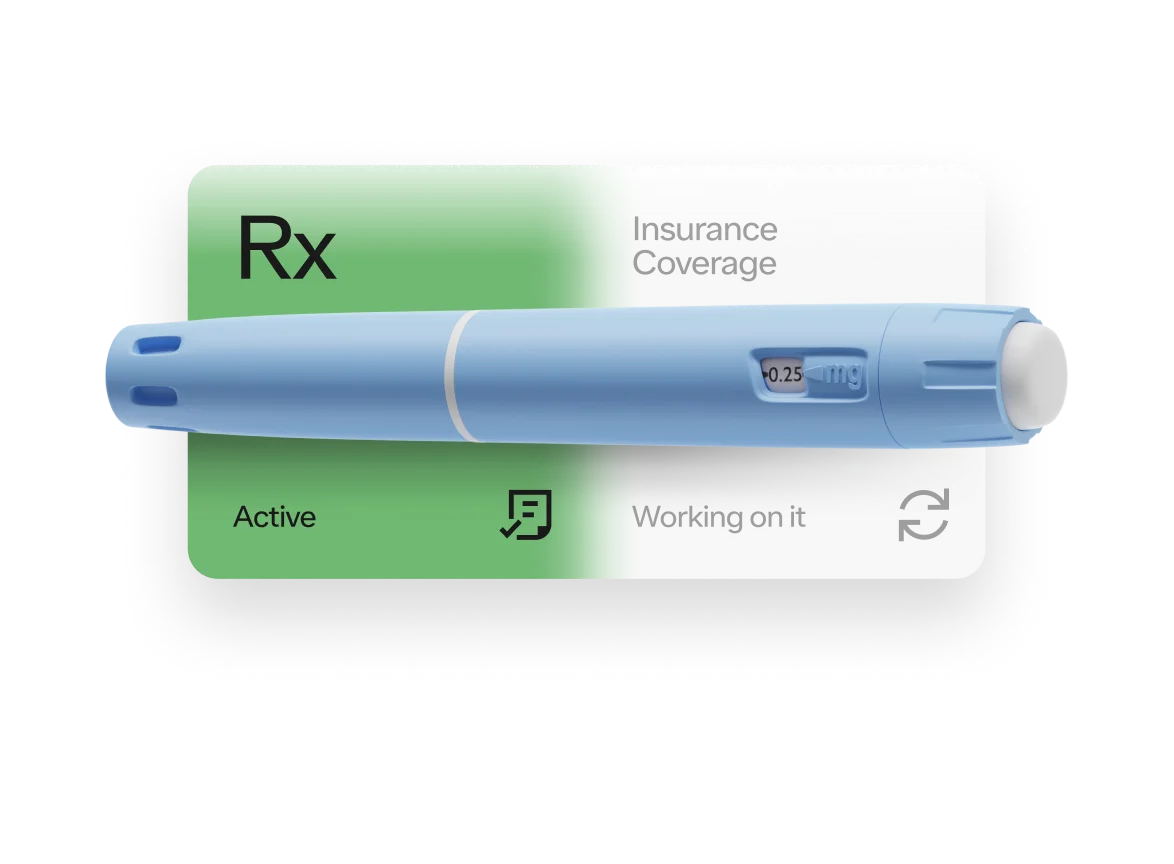Key takeaways
Aetna may or may not cover Ozempic. Coverage can depend on your plan’s prescription drug coverage and whether you are taking Ozempic for type 2 diabetes or weight loss.
Aetna typically requires prior authorization before Ozempic will be covered, especially if you don’t have diabetes.
Some plans may also require that other diabetes medications, such as metformin, be tried first before starting Ozempic.
Here's what we'll cover
Key takeaways
Aetna may or may not cover Ozempic. Coverage can depend on your plan’s prescription drug coverage and whether you are taking Ozempic for type 2 diabetes or weight loss.
Aetna typically requires prior authorization before Ozempic will be covered, especially if you don’t have diabetes.
Some plans may also require that other diabetes medications, such as metformin, be tried first before starting Ozempic.
Without insurance, the cost of Ozempic (semaglutide) can reach almost $1,000 for a month’s supply of the medication.
If you’ve been prescribed Ozempic and you have insurance through Aetna, you’re probably wondering if your plan covers Ozempic. Insurance coverage for Ozempic can depend on what you’re taking it for and the prescription drug coverage offered by your plan.
Here’s what you need to know about whether Aetna covers Ozempic.
Does Aetna cover Ozempic?
Aetna’s coverage of Ozempic depends on the specific plan. Some plans we reviewed, including Aetna’s Advanced Control Plan and the Aetna Standard Plan, both cover Ozempic. However, whether Aetna covers Ozempic will depend on the specific coverage details of your plan as well as what you’re taking it for: type 2 diabetes or weight loss.
When Aetna does cover Ozempic, it usually falls in their Preferred Brand drug tier, which has a higher copay than Aetna’s Preferred Generics drug tier. Prior authorization is usually required, as is step therapy (more these in the next section).
Yes, you typically need prior authorization (sometimes called precertification) before Aetna will cover Ozempic, especially if you haven’t been diagnosed with type 2 diabetes. The process for prior authorization can differ between insurance plans, but it usually means your healthcare provider will need to submit paperwork to your insurance plan confirming that you meet their eligibility requirements to take Ozempic.
If Aetna approves the prior authorization request, Ozempic will be covered by your plan. If they don’t, you’ll have to pay out-of-pocket for Ozempic. You can also appeal their denial.
Depending on your specific Aetna plan, you may not need a prior authorization for Ozempic if the last two years of your medical records show the following:
You have been diagnosed with type 2 diabetes.
You have tried a non-GLP-1 medication for diabetes, such as metformin.
You have picked up prescriptions for diabetic supplies, such as blood glucose monitors and test strips.
To see if your Aetna plan requires prior authorization for Ozempic, you can review your plan’s drug formulary (this is a list of all the drugs covered by your plan). If there is a “PA” next to Ozempic, prior authorization is required.
Some Aetna plans may also require step therapy before covering Ozempic. Step therapy means that you need to try one or more “prerequisite drugs” before they will cover Ozempic. Typically, these drugs are FDA-approved to treat the same condition, but for a cheaper price. In the case of Ozempic, the prerequisite drug is metformin. If your Aetna plan requires step therapy, your healthcare provider may need to document and attest that you have tried metformin for one month and it didn’t work well for you, whether that was due to lack of effectiveness, an allergy, side effects or interactions.
Will Aetna cover Ozempic if you don’t have diabetes?
It’s possible that Aetna could cover Ozempic if you don’t have diabetes, but it’s unlikely. Ozempic has two FDA-approved indications: to improve blood sugar control in people with type 2 diabetes, and/or to reduce the risk of experiencing a serious cardiovascular event (such as stroke, heart attack, or death) in people with type 2 diabetes and heart disease.
While Ozempic can lead to weight loss, it is not specifically FDA-approved for weight loss. So, when healthcare providers prescribe Ozempic for weight loss, it is considered an off-label prescription. Off-label prescribing allows healthcare providers to use their discretion and expertise in prescribing the best treatment for their patients, even if that includes a condition outside of the FDA-approved indications. Your healthcare provider can submit a coverage request to Aetna requesting that they cover Ozempic as a weight loss treatment, but, in general, health insurance companies are less likely to cover off-label prescriptions.
Novo Nordisk, the maker of Ozempic, does make another medication called Wegovy that contains the same active ingredient (semaglutide) as Ozempic, but in higher dosage strengths. Wegovy is FDA-approved for weight loss, so it’s possible that your insurance plan may be more likely to cover Wegovy for weight loss. However, you’ll still want to review your drug formulary and check with Aetna, as some Aetna insurance plans specifically exclude weight loss medications from their prescription drug coverage.
How to check if your Aetna plan covers Ozempic
To check if your Aetna plan covers Ozempic, call the Member Services number on the back of your insurance card. You can also contact Aetna using email or chat.
You can also review your plan’s drug formulary, which includes a list of the drugs covered by your plan. To find your formulary, visit the Aetna website here. Select the current year under the “Choose a plan year” drop down menu. Then, select your plan under the “Choose a plan” drop down menu. If you have a Medicare Prescription Drug Plan (PDP) through Aetna, you can find your drug formulary on this website instead.
Novo Nordisk offers a free online tool called NovoCare that allows you to check your insurance coverage. Fill in your information, and the tool will share your plan’s coverage of Ozempic, which may include your estimated out-of-pocket costs. If the tool isn’t able to find information about your Ozempic coverage, you can ask NovoCare to contact Aetna on your behalf.
What if Aetna won’t cover Ozempic
Sometimes, insurance plans deny prior authorization requests. If that happens to you, you can ask your healthcare provider to submit an appeal.
Some insurance plans may choose not to cover Ozempic, but they will cover an alternative medication instead, such as Mounjaro (tirzepatide) or Rybelsus (semaglutide). Review your prescription drug coverage and ask your healthcare provider if one of these Ozempic alternatives could be a good fit for you.
How to save on Ozempic if Aetna won’t cover it
If Aetna won’t cover Ozempic, there are still ways to save on the cost of Ozempic. Websites such as GoodRx, SingleCare, and Optum Perks, offer prescription discount cards for several pharmacies. And if you have a Flexible Savings Account (FSA) or Health Savings Account (HSA), you may be able to apply those funds towards Ozempic.
For help understanding your options, talk to your healthcare provider and your benefits administrator.
DISCLAIMER
If you have any medical questions or concerns, please talk to your healthcare provider. The articles on Health Guide are underpinned by peer-reviewed research and information drawn from medical societies and governmental agencies. However, they are not a substitute for professional medical advice, diagnosis, or treatment.
Ozempic Important Safety Information: Read more about serious warnings and safety info.
Wegovy Important Safety Information: Read more about serious warnings and safety info.
Mounjaro Important Safety Information: Read more about serious warnings and safety info.
References
Aetna-a. (2024). 2024 Aetna Pharmacy Drug Guide: Advanced Control Plan - Aetna. Retrieved Jul. 29, 2024 from https://www.aetna.com/content/dam/aetna/pdfs/aetnacom/individuals-families-health-insurance/document-library/pharmacy/archive-drug-guides/JUN2024_Advanced_Control_Plan_Aetna_06012024.pdf
Aetna-b. (2024). 2024 Aetna Pharmacy Drug Guide: Advanced Standard Plan. Retrieved Jul. 29, 2024 from https://fm.formularynavigator.com/FBO/41/2024_Aetna_Standard_Plan_.pdf
Aetna-c. (2024). Aetna® Member Services. Retrieved Jul. 29, 2024 from https://www.aetna.com/individuals-families/member-rights-resources/member-services.html
Aetna. (2020). Antidiabetic Agents - Pharmacy Clinical Policy Bulletins: Aetna Non-Medicare Prescription Drug Plan. Retrieved Jul. 29, 2024 from https://www.aetna.com/products/rxnonmedicare/data/2020/Traditional/Ozempic.html
Aetna-d. (2024). Customizable weight management solutions. Retrieved Aug. 6, 2024 from https://www.aetna.com/content/dam/aetna/pdfs/employers-organizations/customizable-weight-management-solutions.pdf
Aetna-e. (2024). Find out if your medicine is covered. Retrieved Jul. 29, 2024 from https://www.aetna.com/individuals-families/find-a-medication.html
Aetna-f. (2024). Get more from your Medicare Prescription Drug Plan (PDP). Retrieved Jul. 29, 2024 from https://www.aetna.com/medicare/index-member-pdp.html
Aetna. (2023). Pharmacy Clinical Policy Bulletins Aetna Non-Medicare Prescription Drug Plan Subject: GLP-1 Agonist Ozempic PA with Limit Policy 2439-C UDR 05-2023. Retrieved Aug. 6, 2024 from https://www.aetna.com/products/rxnonmedicare/data/2024/GLP-1_Agonist_Ozempic_PA_with_Limit_Policy_2439-C_UDR_05-2023.html
Aetna-g. (2024). Weight Reduction Programs and Devices. Retrieved Jul. 29, 2024 from https://www.aetna.com/cpb/medical/data/1_99/0039.html
NovoCare-a. (2024). Find out if your insurance covers Ozempic. Novo Nordisk. Retrieved Jul. 29, 2024 from https://www.novocare.com/diabetes/products/ozempic/check-coverage.html
NovoCare-b. (2024). Find out the cost for Ozempic. Novo Nordisk. Retrieved Jul. 29, 2024 from https://www.novocare.com/diabetes/products/ozempic/explaining-list-price.html
US Food & Drug Administration (FDA). (2023). Highlights of Prescribing Information: Ozempic (semaglutide) injection, for subcutaneous use. Retrieved Jul. 29, 2024 from https://www.accessdata.fda.gov/drugsatfda_docs/label/2023/209637s020s021lbl.pdf













